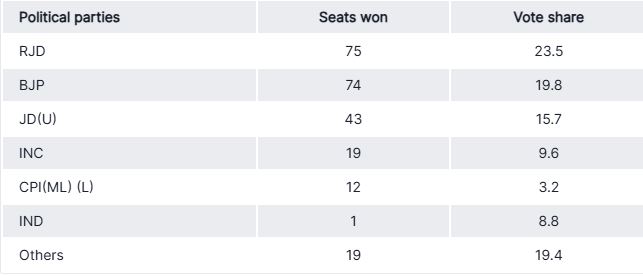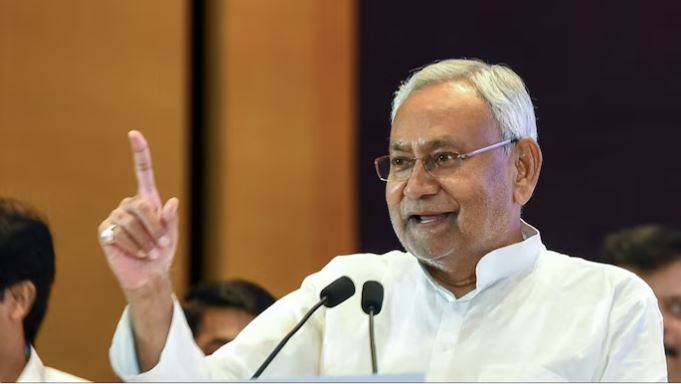New Delhi: As the Waqf Amendment Bill 2025 successfully passed through both the Lok Sabha and Rajya Sabha, the Janata Dal (United) or JD(U), a significant ally of the Bharatiya Janata Party (BJP) in Bihar, encountered a challenge. Five members of Nitish Kumar’s JD(U) resigned in response to the party’s endorsement of the Central government’s Waqf Bill, which was approved by Parliament early on Friday.
The resigning JD(U) leaders include Nadeem Akhtar, Raju Nayyar, Tabrez Siddiqui Alig, the General Secretary of the JD(U) Minority Department, Mohammad Shahnawaz Malik, the Minority State Secretary, and Mohammed Kasim Ansari.
This development has led to speculation regarding the potential impact of Nitish Kumar and his party’s backing of the Waqf Amendment Bill on his electoral prospects in the forthcoming Bihar elections. The 2025 Bihar Assembly election, covering all 243 constituencies, is anticipated to take place in October-November 2025.
With the state elections approaching, the political landscape is charged. The BJP’s initiative to launch the “Saugat-e-Modi” campaign, which aims to provide special kits to underprivileged Muslims, is perceived by the Opposition as an attempt to attract Muslim voters. Additionally, the involvement of various politicians in iftar gatherings has further fueled the conversation.
Amitabh Tiwari, Managing Partner at Ascendia Strategies and a political commentator, asserts that “Nitish [Kumar] has lost significant Muslim support… thus, his backing of the Waqf is a calculated risk.”
Nevertheless, Tiwari notes that the JD(U) possesses a “plus point.” He explains that while the party maintains a relatively consistent vote share in each election, the “composition” of its voter base shifts based on its alliances.
To illustrate this…
In the 2014 Lok Sabha elections, when the JD(U) ran independently, it garnered approximately 16 percent of the votes. At that time, Dalits/Mahadalits and Other Backward Classes (OBCs) constituted the core voter base for the JD(U), according to the political analyst.
When the JD(U) formed an alliance with the Rashtriya Janata Dal (RJD), its vote share remained relatively stable; however, the demographic composition of its voter base shifted. There was a notable increase in support from Muslim and Yadav voters, as stated by Tiwari.
In contrast, during the 2019 Lok Sabha Elections, the JD(U) partnered with the BJP, resulting in a decrease in Muslim and Yadav votes, while it gained support from upper caste communities, Economically Backward Classes (EBC), Other Backward Classes (OBC), and Kurmis.
Tiwari elaborated that the JD(U) maintains a consistent vote share of approximately 12 percent. When allied with the RJD, it can add an additional 4-5 percent from Muslim and Yadav voters, whereas an alliance with the BJP brings in a similar increase from upper caste, OBC, and EBC voters. This results in a total vote share of 16-17 percent in both scenarios.
A key advantage for the JD(U) is that its alliances do not adversely affect its partners’ voter bases. This means that the support for the RJD or the BJP remains unaffected when the JD(U) joins forces with them.
According to Amitabh Tiwari, the JD(U) does not create discord within any coalition, ensuring that the voter bases of all partners remain intact—for instance, Muslim and Yadav voters do not abandon the RJD if the JD(U) aligns with it.
Nevertheless, the outcome of the 2025 elections remains uncertain. Attention is focused on the upcoming Bihar polls, where the NDA (comprising JD(U) and BJP) will compete against the opposition RJD and Congress for the chief ministerial position.
In early 2024, Nitish Kumar ended his alliance with the ‘Mahagathbandhan’ and rejoined the BJP in preparation for the Lok Sabha elections. This marked the fifth occasion on which Nitish Kumar shifted allegiances, aligning with the BJP-led NDA in Bihar’s political landscape.
In the 2020 Bihar elections, the JD(U) contested alongside the RJD and Congress. The performance of the political parties during these elections is as follows:




